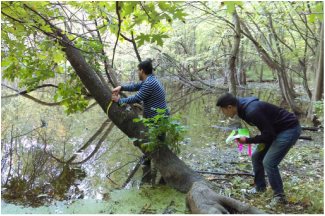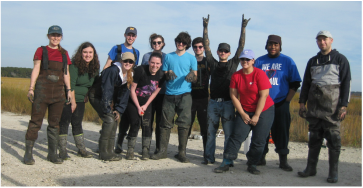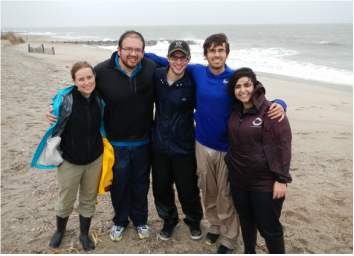Biology 192: General Biology II for Science Majors
Introduction to evolution, ecology, organismal development and diversity. Lecture-laboratory.
Introduction to evolution, ecology, organismal development and diversity. Lecture-laboratory.

Biology 215: Ecology
This course provides a broad survey of ecological principles and methods of lab and field investigation. Topics include the distribution and abundance of organisms in nature including those factors that influence population size, growth and regulation; species interactions; community organization and change; and ecosystem level processes that move matter and energy among the living and nonliving parts of the environment.
Biology 306/406: Research Methods & Applied Biostatistics
Modern biology uses the powerful tools of data analysis to draw objective conclusions. This spans a wide range of fields in Biological Sciences, Health, and Behavioral Sciences. This course will enhance your critical thinking and data analysis skills through an increased understanding of how research methods are linked to both biological questions and statistical approaches. We will discuss the effectiveness of a variety of experimental designs and statistical approaches to answer questions, and apply statistics to real data and draw conclusions. Course topics will include: analysis of variance, analysis of covariance, simple linear and multiple regression, logistic regression, AIC model selection. A computer lab will introduce and be conducted in the statistical software program ‘R’, and will cover graphing and statistical analyses of biological datasets.
Modern biology uses the powerful tools of data analysis to draw objective conclusions. This spans a wide range of fields in Biological Sciences, Health, and Behavioral Sciences. This course will enhance your critical thinking and data analysis skills through an increased understanding of how research methods are linked to both biological questions and statistical approaches. We will discuss the effectiveness of a variety of experimental designs and statistical approaches to answer questions, and apply statistics to real data and draw conclusions. Course topics will include: analysis of variance, analysis of covariance, simple linear and multiple regression, logistic regression, AIC model selection. A computer lab will introduce and be conducted in the statistical software program ‘R’, and will cover graphing and statistical analyses of biological datasets.
Biology 332/432: Population Ecology
This course is designed to expose students to concepts and models in population biology, and their application to predict population trends, for sustainable management of populations, conservation biology, and disease spread.
This course is designed to expose students to concepts and models in population biology, and their application to predict population trends, for sustainable management of populations, conservation biology, and disease spread.
Courses occasionally taught:

Biology 318: Field Studies in Marine & Estuarine Ecosystems
This course is designed for science majors with an interest in marine and estuarine biology and will examine this subject from an ecological perspective. The primary objectives of the course are: 1) to explore the diversity of marine and estuarine life; 2) to understand the manner in which physical factors in the environment influence dynamics of these communities; 3) to build connections between physical and biological factors that influence biological diversity in marine systems; 4) to understand the role that humans play in shaping these dynamics; and 5) to develop professional connections and gain real-life experiences in marine science.
This course is designed for science majors with an interest in marine and estuarine biology and will examine this subject from an ecological perspective. The primary objectives of the course are: 1) to explore the diversity of marine and estuarine life; 2) to understand the manner in which physical factors in the environment influence dynamics of these communities; 3) to build connections between physical and biological factors that influence biological diversity in marine systems; 4) to understand the role that humans play in shaping these dynamics; and 5) to develop professional connections and gain real-life experiences in marine science.

Biology 389/489: Research in Field Biology
Bio 389/489 is a research-intensive course designed for science majors and graduate students that will focus on developing skills of collaborative field-based research. Throughout the course, students (working in groups of 2 or 3) will follow the scientific method to develop and carry out an original research project. Students will use the primary literature to learn the current state of research in an area that interests them, then use that knowledge to develop a novel question they can test with a field-based experiment. Data collected will be analyzed and results compiled into a ‘publication quality’ paper. Students will then present their study to their peers in the form of an oral or poster presentation. (Note: a couple of these projects have resulted in publications in peer-reviewed journals)
Bio 389/489 is a research-intensive course designed for science majors and graduate students that will focus on developing skills of collaborative field-based research. Throughout the course, students (working in groups of 2 or 3) will follow the scientific method to develop and carry out an original research project. Students will use the primary literature to learn the current state of research in an area that interests them, then use that knowledge to develop a novel question they can test with a field-based experiment. Data collected will be analyzed and results compiled into a ‘publication quality’ paper. Students will then present their study to their peers in the form of an oral or poster presentation. (Note: a couple of these projects have resulted in publications in peer-reviewed journals)
Courses previously taught:
HNAS 699: Biostatistics (Rosalind Franklin University of Medicine & Science)
Biology 315: Quantitative Biology I (University of Calgary)
Human Health & Disease (Asian University for Women)
Environmental Issues of Dams (Asian University for Women)
HNAS 699: Biostatistics (Rosalind Franklin University of Medicine & Science)
Biology 315: Quantitative Biology I (University of Calgary)
Human Health & Disease (Asian University for Women)
Environmental Issues of Dams (Asian University for Women)
